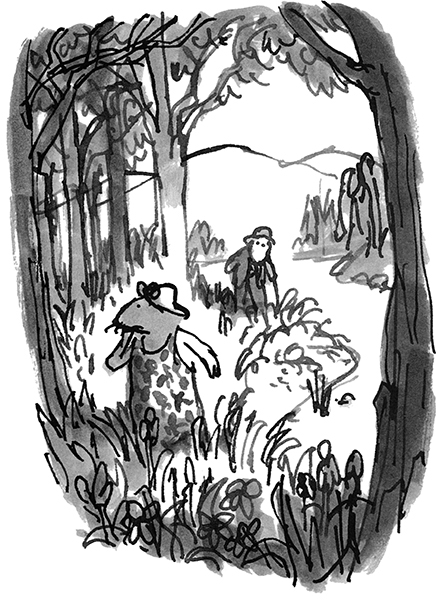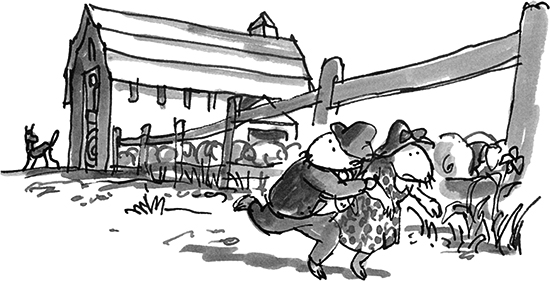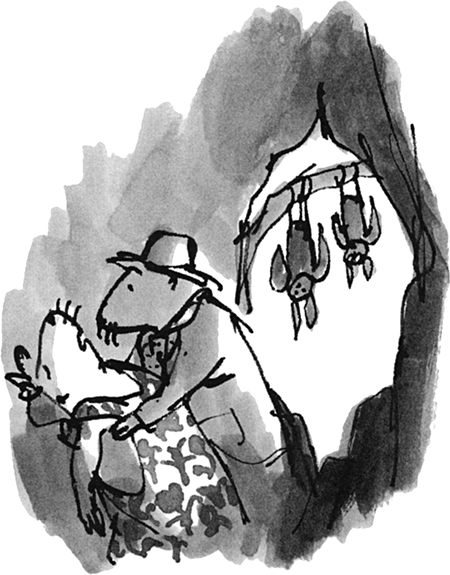
When Fred caught up to Phoebe, she was wringing her paws on the bank of the stream, not far from the fir bridge he’d used during their courtship.
“This is terrible!” she said. “My nose is so stuffed up I can’t smell a thing. Why do I have to have a cold today of all days?”
Because the beast caked us with mud in the middle of the night, Fred thought. But he just sniffled sympathetically and said, “I can’t smell much either.”
“Do you see any sign of her?”
He looked up and down the banks of the stream. The only creature in sight was the otter, slumped at the foot of his mud slide. As soon as Fred called out, the otter came racing over, his dark eyes gleaming at Phoebe.

“You’re Babette’s sister, aren’t you?” he said.
Phoebe nodded. “Have you seen a human—”
“Where is she?” the otter interrupted.
“We don’t know, that’s why we’re asking.”
“Babette. Where’s Babette?”
“Oh, she’s in the cave.”
“What cave?”
“Around the other side of the hill, but—”
“Cave, eh,” said a muskrat, popping out of a hole in the bank.
Before Phoebe could say another word, the otter was racing off toward the cave with the muskrat at his heels. It was a comical sight, but Phoebe’s obvious frustration kept Fred from laughing.
“Maybe we can find her footprints,” Phoebe said glumly.
Muddy as the stream bank was, Fred followed her along it. There were no human footprints, but plenty of others, and a fresh set of raccoon prints soon led them to the raccoon himself, washing a green apple in the current.
“Aren’t you Babette’s sister?” the raccoon said.
This time Phoebe held her tongue about that. “Did you happen to see a—”
“Where is she?” the raccoon cried, dropping the apple, which was immediately carried off downstream.
“Listen,” Phoebe said. “We’ll answer your question if you answer ours first.”
“Okay, shoot.”
“Have you seen a human child anywhere today?”
“A smelly one?”
“Yes! Where?”
“She was crashing around in the woods over there. Now, where’s Babette?”
“In a cave around the hill,” Fred said as Phoebe dashed up the bank.
The only traces of Margaret the woodchucks found among the trees were some broken twigs and a couple of recently squished toadstools. After combing every square inch of the woods, Fred suggested a bite of lunch.
“How can you possibly think of food at a time like this?” Phoebe asked.
“It’s not me, it’s my stomach,” he said, shifting the blame. “You need to keep up your strength, too, dear. I bet there’s a couple of nice juicy salamanders in this rotten log.”
The rotten log was hollow at one end, and as soon as he poked his head into the dark interior, he pulled it back out with a yelp, holding his snout. Out waddled a porcupine.
“Oh, porcupine, did you see a human child go by here?” Phoebe asked.
Fred was so annoyed at having his punctured snout ignored he was almost glad to hear the porcupine reply, “Hey, aren’t you Babette’s sister?”
Phoebe struck the same deal as with the raccoon, but all the porcupine could tell her was that he’d heard some creature go by, howling like a sick hound. Still, Phoebe forged on, zigzagging over the countryside with Fred traipsing behind, licking his battered snout. She quizzed everyone they met. A skittish chipmunk had barely avoided being trampled under a fiend’s foot. A toad had gotten a passing whiff of skunk. A huge, grinning woodchuck—the giantess from the greenhouse, in fact—had heard about a brutish creature from a little nephew of hers, but had written it off to the youngster’s wild imagination. Nobody was too insignificant for Phoebe to grill: moles, lizards, tree frogs. In her desperation she even approached a rabbit. But Fred drew the line at the badger who’d taken over their old burrow.
“That would just be too painful,” he said.
The milk-giving goat thought she’d heard some bloodcurdling screams off to the west, but their best clue came from yet another admirer of Babette’s: the mink Fred had met his first day at the big stump. In exchange for Babette’s whereabouts, the mink told them he’d seen—and smelled—a human child crawling across the meadow in the direction of the pig farm.
Fred and Phoebe scoured the meadow. In the dry patches they saw grasshoppers, and in the wet parts, snails; otherwise, all they found was a deserted pheasant nest and a rusty oil can. But at dusk, when they reached the brambles near the pig farm, Fred pulled a scrap of cloth off a thorn.
“It stinks,” he said, holding it at arm’s length.
Phoebe grabbed it and clutched it to her breast. “It’s from Margaret’s nightdress,” she whispered.
If Phoebe had searched frantically before, it was nothing compared to the way she now raced back and forth along the pig-farm fence, looking for traces of Margaret among the mud-smeared swine. Fred, who did his best to keep up with her, began to worry about her collapsing. He’d slyly snacked on some snails in the meadow, but he knew for a fact that Phoebe hadn’t had a nibble all day.
A deep, murderous bark sent these worries out of his head. A full-grown German shepherd bolted out of the barn, skidded to a halt, sniffed the air, let out a couple more fur-raising barks, and lunged straight for them.
“This way!” Fred yelled, grabbing Phoebe by the scruff of the neck.

He pulled her toward the maple by the roadside where he’d hid back in the spring, and they dove into the hole just as the demon’s claws hit the tree. While the hound kept attacking the trunk, barking like a lunatic, Fred waited for Phoebe’s congratulations on their narrow escape. But she just stared out the hole and moaned, “Oh, Fred, what if that big dog ate Margaret?”
“Dogs like human beings,” Fred said. “Humans feed the silly beasts—don’t ask me why.”
Rain had driven him into this slummy hole last time, and now, as if by magic, drops began spattering the leaves again. Soon a human being whistled in the distance, and after a few last growls the dog gave up on them and loped away. Joining Phoebe, who was still staring out of the hole, Fred heard a familiar squeaking sound behind the pitter-patter of raindrops.
“Listen,” he said. “It sounds like . . .”
Sure enough, a pair of bats landed on a limb a few feet away and hung there upside down.
“Bats!”
“Thank goodness!” said Ms. Bat. “We’ve been hunting everywhere.”
“You have?”
“Everyone was worried, so we volunteered to be the search party. We thought we heard you over this way, then it started to rain.”
Phoebe poked her head out. “Did Margaret come back to the cave?” she asked breathlessly.
“Not yet,” said Mr. Bat. “But your sister had several callers—a regular parade.”
“Oh, Fred, I know we’ve lost her!” Phoebe cried. “Our poor child!”
“I’m sure she’s just fine, wherever she is,” Fred said.
But he wasn’t so sure about Phoebe. Her breathing got quicker and quicker, then she let out a gurgle, whispered “I know we’ve lost her forever,” and fainted.
“Phoebe!” he cried, catching her.

“The poor dear,” said Ms. Bat. “She really loved that Margaret, didn’t she?”
In the gathering darkness, Fred carefully laid Phoebe down. She really had loved the child. What a rare woodchuck, he thought, to be able to love someone so horrid. He patted Phoebe’s head, smoothing back the fur between her ears. She gradually came to and started weeping.
“You know, we should all be getting back to the cave,” said Mr. Bat. “There’s a real storm brewing.”
“You go on ahead,” Fred said. “Tell Babette and the others we’re all right.”
“Well, see you later then,” said Mr. Bat. “Or not see, exactly . . .”
As the bats whizzed off into the rainy night, Fred took Phoebe’s paw. “What you need is some sleep,” he said.
“How can I sleep when we’ve lost our child?” Phoebe moaned.
The bat was a good weather forecaster. The rain grew heavier, and before long a flash of lightning lit up the hole in the tree. In the brief glow Fred didn’t notice the mess left by the woodpeckers, only the tears in Phoebe’s lovely gray eyes.
The tide of darkness rushed back in on a low rumble of thunder, and Fred moved right up beside Phoebe and gently stroked her back. After a while he lay down and hugged her.